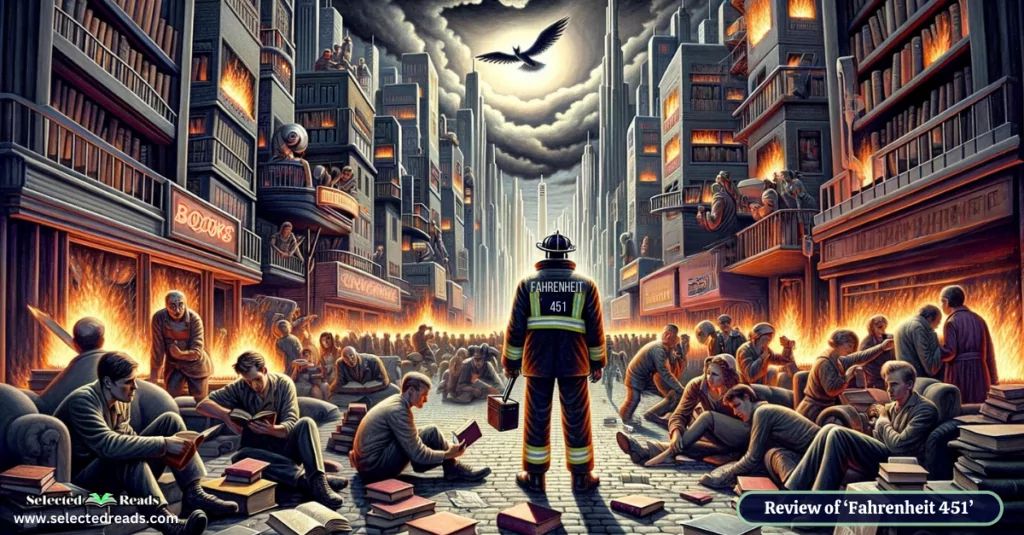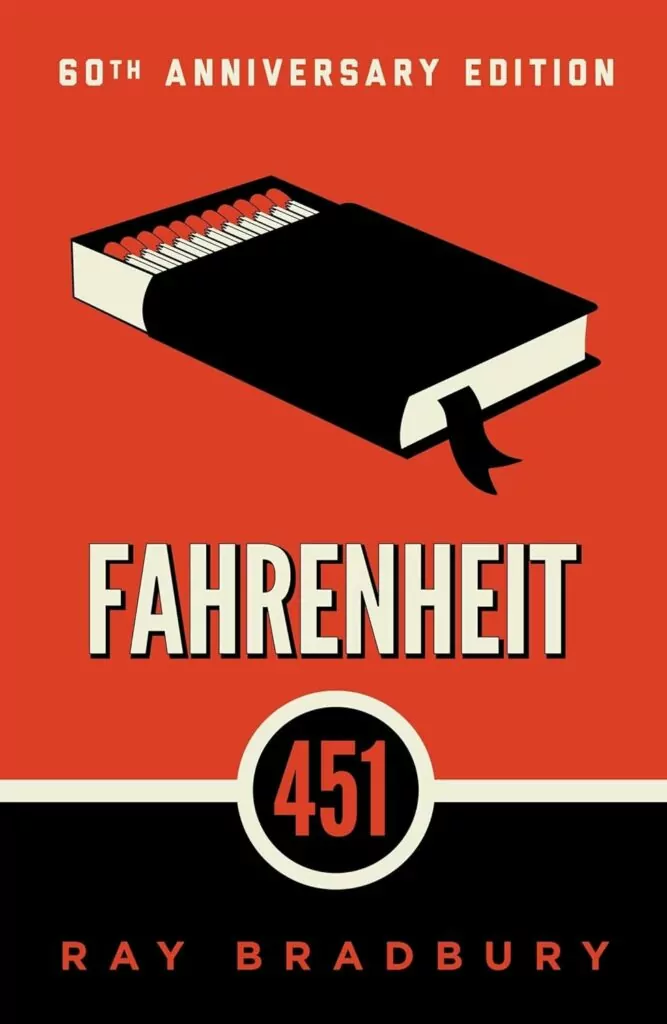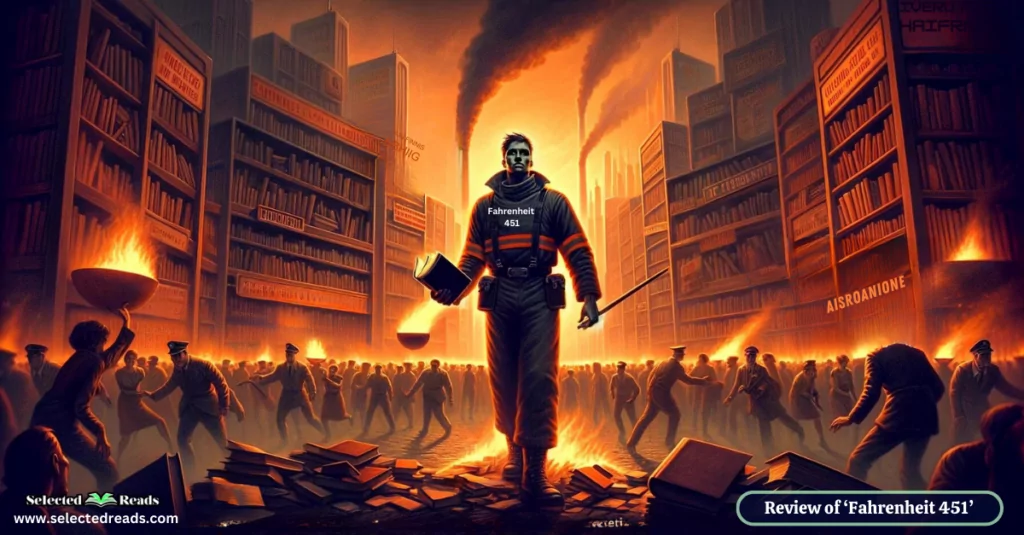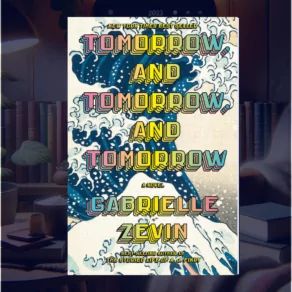Today’s post is all about Ray Bradbury’s “Fahrenheit 451”. This dystopian masterpiece, while set in an unspecified future, continues to resonate with readers for its incisive commentary on societal issues that feel as pertinent today as they were at the time of its publication.
Our discussion of this novel will proceed as follows: First, we’ll provide an extended summary of “Fahrenheit 451,” delving into the storyline that follows Guy Montag, a fireman whose job is to burn books, as he begins to question the society he upholds. We’ll introduce you to the pivotal characters who play instrumental roles in Montag’s awakening and the novel’s exploration of its core themes.
We’ll also unpack the main themes of “Fahrenheit 451,” discussing how Bradbury weaves together motifs of censorship, technology’s impact on human connection, and the value of dissenting voices in a homogenized world. Finally, for those looking to dive deeper into discussion, whether in classrooms, book clubs, or casual conversations, we’ll provide a set of thought-provoking book club questions.
Related: Brave New World Summary, Characters, Themes, and Book Club Questions
Fahrenheit 451 Summary
“Fahrenheit 451” by Ray Bradbury is a profound narrative set in a future where books are banned, and “firemen” are tasked with burning them. This dystopian novel, first published in 1953, has become a touchstone for discussions about censorship, the role of government, and the power of literature. At its heart, the story follows Guy Montag, a fireman who begins to question the society he lives in—a society that values conformity, suppresses dissent, and views books as sources of discord and unhappiness.
Montag’s journey from a compliant citizen to a questioning rebel begins serendipitously with his encounter with Clarisse McClellan, a young neighbor whose curiosity and vivaciousness starkly contrast with the lifeless existence led by most people in their society. Clarisse prompts Montag to start questioning the purpose of his job and, more broadly, the values of his society. This encounter sparks a transformation in Montag, awakening in him a desire for knowledge and truth that leads him down a dangerous path.
As Montag’s disillusionment grows, his relationship with his wife, Mildred, who is obsessed with television and indifferent to Montag’s growing restlessness, becomes strained. Montag’s quest for knowledge leads him to seek out forbidden books and allies who share his thirst for understanding. This rebellion puts Montag at odds with his society and its enforcers, leading to a climactic chase that forces him to flee for his life.
Photo: Amazon
Bradbury’s novel is not just a critique of censorship but a warning about the passivity induced by media consumption and the dangers of a society willing to sacrifice intellectual freedom for the sake of convenience and security. The narrative explores themes of isolation, the conflict between individuality and conformity, and the role of literature in understanding and interpreting the human condition (more on themes later on).
Drawing parallels to contemporary issues, “Fahrenheit 451” remains eerily relevant, touching on the impact of technology on society, the value of critical thinking, and the importance of dissenting voices. Bradbury’s vision of a future where books are forbidden and critical thought is suppressed serves as a reminder of the fragility of freedom and the enduring power of the written word.
Fahrenheit 451 Characters
In “Fahrenheit 451” by Ray Bradbury, the characters play crucial roles in exploring the novel’s themes of censorship, individuality versus conformity, and the power of literature. Here’s a quick overview of some of the key characters:
- Guy Montag: The protagonist, Montag is a fireman whose job is to burn books. His encounter with Clarisse McClellan sparks his transformation from a conformist to a person who questions societal norms and seeks knowledge. Montag’s journey represents the struggle for intellectual freedom and the quest for meaning in a superficial society.
- Clarisse McClellan: A seventeen-year-old who becomes Montag’s neighbor. Clarisse is curious, free-spirited, and inquisitive about the world around her. She loves asking questions and is interested in parts of the world that others overlook. Clarisse’s perspective on life challenges Montag’s views and inspires him to question his role in society and the broader implications of the world’s censorship and conformity.
- Mildred Montag: Montag’s wife, who is absorbed in the shallow entertainments provided by the society, such as watching the “parlor walls” (televisions that cover the walls of their home) and listening to “seashell radios” (earbuds that feed constant noise and entertainment). Mildred’s character represents the apathy and complacency that Bradbury criticizes in the novel. Her disconnection from Montag and the real world highlights the isolating effects of technology and the suppression of deep, meaningful relationships.
- Captain Beatty: The fire chief and Montag’s boss, Beatty is well-read and articulate, using his knowledge to justify the censorship and burning of books. He represents the paradox of an educated individual who enforces ignorance and conformity. Beatty’s character embodies the dangers of using knowledge as a tool for oppression rather than enlightenment.
- Professor Faber: A retired English professor who becomes Montag’s mentor. Faber represents the values of the old world, where literature and intellectual freedom were cherished. He is cautious and fearful but ultimately aids Montag in his quest to challenge the status quo. Faber’s character highlights the importance of wisdom and the courage to act on one’s convictions.
- The Mechanical Hound: A robotic enforcer used by the fire department to track down and kill dissenters. The Mechanical Hound symbolizes the dehumanizing and oppressive nature of technology when it’s used to control and punish rather than to enlighten and empower.
- Granger: The leader of a group of intellectuals and exiles who Montag encounters after fleeing the city. Granger and his group are committed to preserving the knowledge contained in books by memorizing them and passing them on orally. Granger represents hope for the future and the resilience of human spirit and knowledge.
Fahrenheit 451 Themes
In “Fahrenheit 451” by Ray Bradbury, several main themes emerge, each exploring critical aspects of society, human behavior, and ethical considerations. These themes remain relevant, offering insight into contemporary issues as well as the human condition more broadly. Let’s delve into these themes:
- Censorship and Intellectual Freedom: At the core of “Fahrenheit 451” is the theme of censorship, particularly the suppression of dissenting ideas and the control of knowledge through the banning and burning of books. This theme warns against the dangers of a society that seeks to eliminate intellectual diversity and freedom in favor of conformity and compliance. It underscores the value of free thought and the right to access information, suggesting that intellectual freedom is fundamental to a healthy, vibrant society.
- The Role of Technology in Society: Bradbury critically examines the impact of technology on human relationships, communication, and thought processes. In the novel, technology, especially the immersive and distracting “parlor walls” and “seashell radios,” contributes to social isolation, a decline in meaningful interpersonal interactions, and a disengagement from the real world.
- Conformity vs. Individuality: The conflict between the pressure to conform and the desire for individuality is a recurring theme in the novel. Characters like Montag and Clarisse represent individual thought and the courage to question societal norms, while characters like Mildred and Captain Beatty embody the dangers of conformity and unthinking obedience to authority. Bradbury suggests that the suppression of individuality leads to a loss of identity and humanity, advocating for the importance of personal freedom and self-expression.
- The Destructive Power of Ignorance: “Fahrenheit 451” portrays a society that has embraced ignorance, allowing fear and complacency to dictate the suppression of knowledge. The novel illustrates how ignorance can lead to the erosion of culture, the loss of critical thinking skills, and the perpetuation of tyranny.
- The Value of Literature and Critical Thought: Through Montag’s journey, the novel celebrates the transformative power of literature and the importance of critical thinking. Books are depicted as vessels of knowledge, understanding, and empathy, capable of challenging beliefs, sparking imagination, and fostering a deeper connection to the human experience. Bradbury champions the role of literature in promoting critical reflection and the questioning of societal norms.
- Hope and Renewal: Despite its dystopian setting, “Fahrenheit 451” offers a message of hope and the possibility of renewal. Through the character of Granger and the community of book lovers, Bradbury suggests that even in the darkest times, there is the potential for change and the preservation of knowledge for future generations.
Fahrenheit 451 Book Club Questions
Here are some questions that could spark insightful discussions:
- Interpretation of Fire: Fire plays a central role in “Fahrenheit 451.” How do different characters perceive and use fire? Discuss how Bradbury uses fire as a symbol throughout the novel.
- Character Transformation: Guy Montag undergoes significant changes throughout the book. Discuss the factors that contribute to Montag’s transformation. How do his interactions with Clarisse, Mildred, and Captain Beatty influence his journey?
- Role of Technology: Technology in “Fahrenheit 451” is both advanced and oppressive. Discuss how Bradbury’s portrayal of technology compares to our current reality. What warnings does the novel provide about the use of technology in society?
- Themes of Censorship and Freedom of Expression: “Fahrenheit 451” explores the consequences of censorship and the suppression of ideas. What are the dangers of censorship as depicted in the novel? How does this theme resonate with contemporary issues?
- Clarisse’s Influence: Clarisse McClellan is a catalyst for Montag’s change but has limited presence in the novel. Discuss the impact of Clarisse’s character on Montag and the novel’s themes. Why do you think Bradbury chose to have her influence felt so strongly despite her brief appearance?
- The Role of Literature and Education: The novel presents a society that has devalued literature and critical thinking. Discuss the importance of literature and education in preserving culture and promoting individual thought. How does this reflect in our society today?
- Mildred’s Character and Society’s Values: Mildred represents the complacency and superficiality of society. Discuss how her character reflects the values of the society in the novel. What does her obsession with the “parlor walls” and indifference to Montag’s crisis say about the world Bradbury has created?
- Captain Beatty as the Antagonist: Captain Beatty presents complex arguments for censorship and conformity. Discuss Beatty’s worldview and motivations. Do you think he believes in the society he upholds, or is he also a victim of its values?
- The Ending and the Phoenix Symbol: The novel ends with the city’s destruction and the hope for renewal. Discuss the symbolism of the phoenix and how it relates to the themes of destruction and rebirth in the novel. What message does Bradbury leave the reader regarding the future?
- Relevance Today: Considering the novel was published in the early 1950s, in what ways is “Fahrenheit 451” relevant to today’s society? Discuss any parallels you see between the book’s world and our own, especially regarding media consumption, technology, and societal values.
Related: The Handmaid’s Tale Summary, Characters, and Book Club Questions
Final thoughts
In revisiting “Fahrenheit 451,” we’re reminded of the power of literature to provoke thought, evoke empathy, and inspire change. Bradbury’s masterpiece challenges us to look beyond the surface, to question the narratives we are fed by media and authority, and to cherish the transformative power of books. As educators, readers, and citizens, let’s carry forward the message of “Fahrenheit 451″—to never stop questioning, learning, and fighting for a world where knowledge is accessible to all and where the flames of curiosity and critical thought burn brighter than any fire set to censor and destroy.









